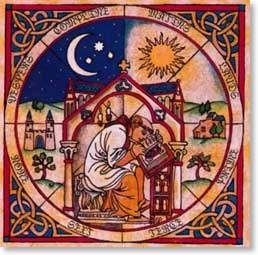
In a recent post, I observed that, looking back, most of my spiritual missteps have derived from the temptation to do too much, too soon. What can seem like a noble impulse, a holy ambition, too often signals existing mistrust, impatience, insecurity and self-doubt. The temptation can be especially strong as one arrives at the beginning of an exciting, new ministry. These thoughts have led me in recent days to reclaim a modest practice from a liturgics class in seminary: the praying of the hours.
As developed in early centuries of the church, the hours-as-prayer run more-or-less like this:
- Matins (during the night, at midnight-ish); also called Vigils or Nocturns
- Lauds or Dawn Prayer (at Dawn, or 3 a.m.)
- Prime or Early Morning Prayer (First Hour = approximately 6 a.m.)
- Terce or Mid-Morning Prayer (Third Hour = approximately 9 a.m.)
- Sext or Midday Prayer (Sixth Hour = approximately 12 noon)
- None or Mid-Afternoon Prayer (Ninth Hour = approximately 3 p.m.)
- Vespers or Evening Prayer (around 6 p.m.)
- Compline or Night Prayer (before retiring, generally 9 p.m.-ish)
Some years ago I wrote a newsletter article that I reread today; it captures something of my experience of the rhythm of the hours - by which I slowly surrender the illusion of my immortality and receive as gift what Stanley Hauerwas calls "the sheer beauty, the absolute contingency, of existence." Indeed, Hauerwas says that prayer may be the joy that comes from acknowledging this gift. Anyway, here is my earlier reflection:
“Guide us waking, O Lord, and guard us sleeping; that awake we may watch with Christ and asleep we may rest in peace.” - from Compline, of the Book of Common Prayer
The nights are darker, sooner. Long walks through cool grass know the familiar crunch of brown and dried-out leaves again. One has to believe that, someday soon, temperatures also will join the slow autumnal change, the visible decay of summer’s life into winter’s hibernation. If you are anything like me, feeling like July was just one blink from yesterday, you may ask yourself, “Just where did the time go?” Where did it go, indeed.
Time is a funny kind of math; we spend it, we manage it, we count it, but for the life of us, we cannot add time to itself. Here’s an example: I read recently that the average American watches four hours and thirty-five minutes of television a day. According to the math, that’s 131,000 hours over the average life-span, or 14.94 years. And yet, even if you or I gave up all television viewing today, we wouldn’t get a six-and-one-half year rebate at life’s end. Time simply does not collect that way. Each loss belongs to its own day.
Indeed, one of the most humbling aspects of being human--sleep--requires that even the most productive days have a reset button, a sign that says, “Go no farther, but rest, wake-up, and begin again.” There is a rhythm to the created order--an unrelenting monotony that cries out, “Strive if you must, but know the limits of your days.”
The limits of our days restrict us to that which is before us; so doing, these “limits” free us to waste time in most extraordinary ways: watching the winds gust, leaves fall; finding the fingerprints of an Other in the deep, streaked blue of sky, among the quiet sparkle of stars; in the tanned face of the stranger, in the bright voice of a friend. Because of the limits of each day, there can be no blurring of all time into a seamless ambition for more progress. Each day has its ending. Each new day owns a dawn. And so we watch; we listen. Finally, it strikes me that the embrace of each day is the beginning of prayer, which allows us to waste time with God.
It is not by accident that the Christian life is marked by daily prayer. The dailiness of prayer is not just good Christian “discipline”; it is the unveiling of our dependence on God; it is the shaping of each day in, around, and through the presence of God in our midst; it is the necessary stillness that calls us to the surrender of our whole lives to God.
The Christian life is sometimes made out to be a pretty intimidating monster of its true self. “Where do I start?” “What if I can’t recite the Prayer Book by heart?” “What if I find myself struggling down the road?” “What if, after all is said and done, I’m just not good enough?” But watch with Christ; rest in peace. Stop your busyness--if only for a handful of minutes--and pray. Set regular times aside and pray, one time, each day. Begin to reclaim the rhythm of your days. Dwell in the day set before you. Practice the humble patience of one aware that the Spirit’s desire is to soak us--you and me--with his fullness of joy and his presence.
If you would give your whole life to God, take a deep breath, and begin with today.


No comments:
Post a Comment